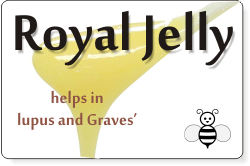If you have been searching for a natural treatment for diabetes type 2 and still haven’t decided on anything, take a look at what royal jelly can do.
There already have been lots of studies showing the role of royal jelly in reduction of serum glucose and lipids in animals and healthy subjects. But recent studies have also proved the beneficial influence on patients with type 2 diabetes.
Type 2 diabetes represents the fourth major public health problem worldwide. And natural treatments are the most wanted treatments nowadays, due to lack of side-effects.
Royal Jelly has insulin-like activity and blood glucose modulating properties, that have been reported both in animals and humans. Besides, it brings positive results in decreasing the collateral damages brought by this disease in the reproductive system, pancreas, liver, skin and so on.
Studies and clinical trials have shown improvements in diabetics at the doses of 1 g royal jelly taken 3 times per day, for 8 weeks.
I’d say it’s worth trying it.
! Yet, make sure you are not allergic to it.
If you are allergic to other bee products, it’s likely you are allergic to royal jelly, too. Also if you have a highly allergic sensitivity, try it first in very tiny amounts, like 0.1 mg, see what happens and increase the quantity little by little till you get to the desired dose.
And thirdly, be careful if you have asthma. Though it is said royal jelly can also treat asthma, there have been reported cases of allergic reactions, even anaphylactic ones, in asthmatic people.
As to what is the best form to take royal jelly, go with fresh royal jelly. Amazon.com can sell you some good quality products, shipped in isofoam boxes or other insulating materials. Read more about the storage conditions in the presentation page: Royal jelly.
Below are some recent studies and clinical trials, supporting the beneficial effect of this ancient remedy on type 2 diabetics.
RJ decreases glucose concentration
• The study published in August 2016, Effect of Royal Jelly Intake on Serum Glucose, Apolipoprotein A-I (ApoA-I), Apolipoprotein B (ApoB) and ApoB/ApoA-I Ratios in Patients with Type 2 Diabetes: A Randomized, Double-Blind Clinical Trial Study, by Khoshpey B et al., from Islamic Azad University, Tehran, Iran and University of Massachusetts, Worcester, Massachusetts, USA, determined the effect of royal jelly intake on serum glucose, apolipoprotein A-I (ApoA-I), apolipoprotein B (ApoB) and ApoB/ApoA-I ratios in patients with type 2 diabetes.
Fifty patients with type 2 diabetes participated in this double-blind, placebo-controlled study. There were two groups formed, one group received placebo pills and one group received royal jelly in doses of 1000 mg 3 times per day for 8 weeks. The results showed that glucose concentrations decreased in the RJ group (-9.4 mg/dL vs. 4 mg/dL; p=0.011)
Their conclusion: “These data suggest that RJ intake may have desirable effects on serum glucose, Apo-A-I concentrations and ApoB/ApoA-I ratios in people with type 2 diabetes.”
While the above study showed good results after 8 weeks of treatment, a single dose of royal jelly is ineffective (see the next study). It has to be a long time treatment, not a short one.
• The study published in September 2015, Effect of Fresh Royal Jelly Ingestion on Glycemic Response in Patients With Type 2 Diabetes, by Mobasseri M et al. from Iran aimed to investigate the effect of a single dose of fresh RJ as a complementary therapy on glycemic response in patients with type 2 diabetes.
This andomized clinical trial used 40 patients and give them either placebo or 10 g fresh Royal jelly after overnight fasting. The tests showed that RJ did not appear to have significant immediate effects on glycemic factors in patients with type 2 diabetes.
• The study Effects of royal jelly supplementation on glycemic control and oxidative stress factors in type 2 diabetic female: a randomized clinical trial, by Pourmoradian S et al. from Tabriz University of Medical Sciences, Tabriz, Iran, and published in May 2014, also investigated the effects of royal jelly supplementation in diabetic females.
The clinical trial was done on 50 type 2 diabetic females, split in 2 groups: placebo and royal jelly treatment. The women received a daily dose of 1,000 mg royal jelly soft gel. Not even in its fresh form! For 8 weeks.
The results showed that after royal jelly supplementation, the mean fasting blood glucose decreased remarkably, there was a significant reduction in the mean serum glycosylated hemoglobin levels and a significant elevation in the mean insulin concentration. The royal jelly supplementation significantly increased erythrocyte superoxidase dismutase and glutathione peroxidase activities and decreased malondialdehyde levels.
Their conclusion: “On the basis of our findings, it seems that royal jelly supplementation may be beneficial in controlling diabetes outcomes.”
see also: Can diabetics eat honey?
Royal jelly ameliorates hyperglycemia and hepatic steatosis.
 • The study published in January 2017, Royal jelly ameliorates diet-induced obesity and glucose intolerance by promoting brown adipose tissue thermogenesis in mice, by Yoneshiro T et al. from the Laboratory of Biochemistry, Department of Biomedical Sciences, Japan, investigated anti-obesity effects of RJ supplementation and their relation to physical activity levels and thermogenic capacities of brown (BAT) and white adipose tissue (WAT).
• The study published in January 2017, Royal jelly ameliorates diet-induced obesity and glucose intolerance by promoting brown adipose tissue thermogenesis in mice, by Yoneshiro T et al. from the Laboratory of Biochemistry, Department of Biomedical Sciences, Japan, investigated anti-obesity effects of RJ supplementation and their relation to physical activity levels and thermogenic capacities of brown (BAT) and white adipose tissue (WAT).
The results showed that dietary royal jelly, not bee larva (aka apilarnil), suppressed HFD-induced accumulations of WAT and hepatic TG without modifying food intake. Royal jelly improved hyperglycemia and the homeostasis model assessment-insulin resistance.
Their conclusion: “Dietary RJ ameliorates diet-induced obesity, hyperglycemia, and hepatic steatosis by promoting metabolic thermogenesis in BAT in mice. RJ may be a novel promising food ingredient to combat obesity and metabolic disorders.”
also read: What supplements lower cholesterol and normalize blood pressure? Have you tried royal jelly?
It decreases insulin resistance index
• The study published in June 2015, Does Supplementation with Royal Jelly Improve Oxidative Stress and Insulin Resistance in Type 2 Diabetic Patients?, by Shidfar F et al. from Iran University of Medical Sciences, Tehran, Iran, determined the effect of RJ intake on serum total antioxidant capacity, Malondialdehyde and insulin resistance in type 2 diabetes mellitus.
The randomized controlled trial used 46 type 2 diabetic patients, aged 25-65 years. The non-placebo group received 1000 mg of RJ supplement 3 times daily for 8 weeks.
The results showed that “in comparison with placebo, HOMA-IR (Insulin resistance index) decreased (P=0.015) while serum total antioxidant capacity increased significantly in RJ group (P=0.016).”
It improves hyperglycemia in diabetis
• The study published on PubMed in November 2016, Royal jelly improves hyperglycemia in obese/diabetic KK-Ay mice, by Yoshida M et al. from Kyoto Sangyo University, examined whether royal jelly can prevent obesity and ameliorate hyperglycemia in type 2 diabetes. The study was done on mice again, the researchers measuring body weight, plasma glucose and insulin levels.
After 4 weeks of royal jelly administration the mice had an improved hyperglycemia and a partially suppressed body weight gain, although the latter effect did not reach statistical significance.
But royal jelly administration did not improve insulin resistance.
Their conclusion: “The improvement in hyperglycemia due to long-term RJ administration may be because of the suppression of G6Pase expression through the upregulation of AdipoQ and AdipoR1 mRNA and pAMPK protein expressions.”
It reduces other damages produced by diabetes:
1. It improves oxidative damage induced in liver and pancreas of diabetic rats
• The study from 2016, Improvement in Serum Biochemical Alterations and Oxidative Stress of Liver and Pancreas following Use of Royal Jelly in Streptozotocin-Induced Diabetic Rats, by Ghanbari E et al. from the Faculty of Science, Urmia University, Iran, used rats which were diabetic induced with streptozotocin (STZ).
The mice received royal jelly in a dose of 100 mg/kg body weight, administered orally for 42 days. After the tests it was shown that royal jelly treatment restored the changes of the diabetic rats to their normal levels. Even more, it significantly improved reduced levels of FRAP 9 (ferric reducing antioxidant power) and catalase, as well as high malondialdehyde level in liver and pancreas (P<0.05).
Their conclusion: “RJ improves oxidative damage induced by STZ in the liver and pancreas of rats; therefore, it can be considered as an effective and alternative treatment for diabetes.”
2. It solves the damages done to males’ reproductive system, both to quality of sperm and libido
Diabetes mellitus does not come alone. Men suffer more from this disease, as they are touched in the highest sensitive point: their masculinity! Testicular weight, sperm count, motility, viability and serum testosterone levels – they will all be affected. Royal jelly is known to increase all these parameters in healthy subjects, but it also helps diabetics. Here are some recent studies that support this.
• The study from April 2015, Study on the effect of royal jelly on reproductive parameters in streptozotocin-induced diabetic rats, by Ghanbari E et al. from Urmia University, Iran, investigated the effects of royal jelly on reproductive parameters of testosterone and malondialdehyde (MDA) production in diabetic rats.
The rats received by gavage a dose of 100 mg/kg body weight, for 6 weeks. The results showed that:
royal jelly improved reproductive parameters such as testicular weight, sperm count, viability, motility, deformity, DNA integrity, chromatin quality, serum testosterone and testicular tissue MDA levels in diabetic rats.
• Another study on the same issue, Protective effects of royal jelly against testicular damage in streptozotocin-induced diabetic rats, was performed by Karaca T et al. from Turkey.
While it is known that diabetes induces a significant increase in testicular apoptotic cell death (caspase-3-positive cells), their number decreased after the royal jelly treatment.
3. It’s beneficial in weight management
• The study from December 2012, Effects of royal jelly supplementation on body weight and dietary intake in type 2 diabetic females, byPourmoradian S et al. from Tabriz University of Medical Sciences, Tabriz, Iran, evaluated the effects of royal jelly supplementation on body weight, total daily energy and macronutrients intakes in type 2 diabetic females. 50 diabetic females received 1000 mg royal jelly soft gel or placebo, for 8 weeks and the results showed royal jelly decreased the mean body weight while it increased insignificantly in placebo group.
Their conclusion: “Supplementation with royal jelly may be beneficial in weight management of diabetic patients.“
—– ADS—–
—————






